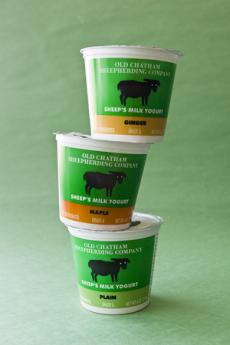PRODUCT REVIEW: Old Chatham Sheep’s Milk Yogurt
 |
People who love fine cow’s milk yogurt may become instant fans of sheep’s milk yogurt—smoother, richer and creamier. Old Chatham Sheepherding Company, producers of acclaimed sheep’s milk cheeses, makes an excellent sheep’s milk yogurt that is more nutritious and healthy than cow’s milk yogurt. The 100% natural line (no artificial thickeners, stabilizers, colors, etc.) also contains probiotic cultures. You also can cook with sheep’s milk yogurt: It does not break down at high temperatures like cow’s milk yogurt.
Sheep were the first animals to be domesticated as mankind transitioned from nomadic hunters to sedentary farmers. Eventually, man discovered how to transform milk into yogurt and cheese. While sheep and goats provided milk and cheese* to ancient civilizations and are still the staple dairy animals in many areas of the world, cows have replaced sheep in countries that have grazing land for them, because of their higher yield: A sheep can give just one quart of milk per day (a high-producing breed, 1.5 quarts); a goat, 3 quarts; a cow, 14 quarts. The lower yield is also why goat’s and sheep’s milk products are usually more expensive than their cow’s milk counterparts. |
|
|
*Some well-known sheep’s milk cheeses include Feta, Manchego, Ossau-Iraty, Pecorino Romano and Roquefort. Old Chatham Sheepherding Company has been delighting specialty food consumers for 15 years with its farmstead sheep cheeses—farmstead meaning that the products are made from the milk of the farm’s own animals. Starting with 150 ewes in 1993, the company now has more than 1,000 East Friesian purebred and crossbred sheep, and is the largest sheep dairy farm in the U.S. The fields and pastures are organically managed; while the company has not pursued organic certification, no hormones, routine antibiotics, herbicides or pesticides are used. Read the full review on TheNibble.com. |
||